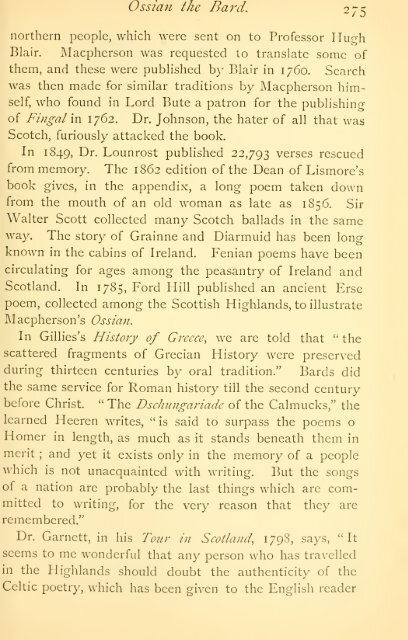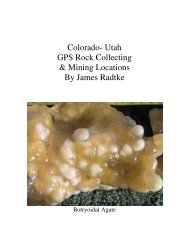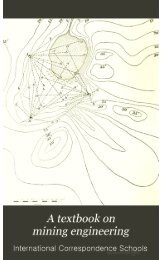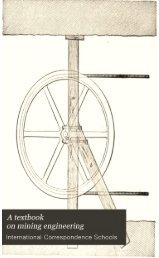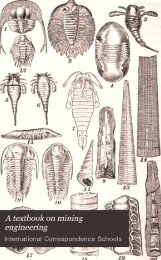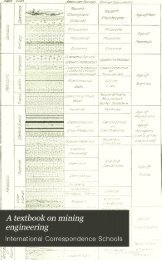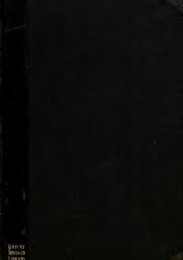- Page 2:
2-.I3./S ^X tue ^hwloglai ^ ^v* PRI
- Page 6 and 7:
SOME OTHER WORKS BY THE AUTHOE GEOG
- Page 8 and 9:
[The rights of Translation and Ref>
- Page 10 and 11:
vi Preface. ever associated with hu
- Page 12 and 13:
Vlll Contents. SERPENT FAITH ... SU
- Page 14 and 15:
2 Irish Druids. deliberations on la
- Page 16 and 17:
4 Irish Dj'iiids. thoughtful minds.
- Page 18 and 19:
6 Irish Druids, with the Irish Carr
- Page 20 and 21:
S 17'ish Dritids. party of the Ling
- Page 22 and 23:
lo h'ish Druids. peculiar manifesta
- Page 24 and 25:
^- h-ish Druids. no high opinion of
- Page 26 and 27:
' Druid. What great ' evil is it th
- Page 28 and 29:
— i6 Irish Drttids. probability i
- Page 30 and 31:
8 1 Irish Dricids, bear cups. Torqu
- Page 32 and 33:
— 20 Irish Druids, system of Drul
- Page 34 and 35:
— 2 2 Irish Dmids. Druldic residu
- Page 36 and 37:
24 Irish Druids. would now only exc
- Page 38 and 39:
2 6 Irish Druids. Culdeeism, the in
- Page 40 and 41:
putting on religious wee Is ; the S
- Page 42 and 43:
30 Irish Druids. Colgan contended t
- Page 44 and 45:
3- Irish D7^inds, had a religion of
- Page 46 and 47:
34 Irish Druids, The mystical, but
- Page 48 and 49:
36 Irish Druids. but the charlatane
- Page 50 and 51:
— — 38 h'ish D}'uids. alogy of
- Page 52 and 53:
40 Irish Druids. religion changed,
- Page 54 and 55:
42 hdsh Druids, — it is written,
- Page 56 and 57:
44 Irish D^^inds. in 1522, English
- Page 58 and 59:
46 Irish Druids. — God!' Keane ca
- Page 60 and 61:
4^ Irish D7^tnds. in the time of Pl
- Page 62 and 63:
50 Irish D7'2iids. DRUIDICAL MAGIC.
- Page 64 and 65:
: 52 IrisJi D7^iuds, to Finnen, a M
- Page 66 and 67:
" 54 Irish Drtdds. ing nine apples
- Page 68 and 69:
56 Irish Drinds. Spiritualism, in a
- Page 70 and 71:
58 Irish Dr^iids. that " the GalUc
- Page 72 and 73:
— 6o Irish Druids, Grainne, the h
- Page 74 and 75:
62 Irish Druids. Among ancient supe
- Page 76 and 77:
— 64 Irish D 7^211 ds. ferent ; f
- Page 78 and 79:
— — 66 Irish Drtiids. man, 300
- Page 80 and 81:
68 Irish Druids. people than either
- Page 82 and 83:
JO Irish Druids. current of gross f
- Page 84 and 85:
72 h'ish Di'iiids. garment." Clemen
- Page 86 and 87:
74 Irish Druids, — born as a man.
- Page 88 and 89:
PART II. EARLY RELIGIONS OF THE IRI
- Page 90 and 91:
Old Irish Relis'ions. ^> "To separa
- Page 92 and 93:
So Old Irish Rcli(rions. Dr. Todd,
- Page 94 and 95:
82 Old Irish Rclio-ions. — There
- Page 96 and 97:
84 Old Irish Religions. — Andrew
- Page 98 and 99:
86 Old hHsh Reli'o-ions. exposed na
- Page 100 and 101:
— SS Old Irish Reli,cions. bend i
- Page 102 and 103:
90 Old Irish Religions. — man or
- Page 104 and 105:
; 92 Old Irish Religions. Danish, D
- Page 106 and 107:
— 94- Old Irish Religions. ; Some
- Page 108 and 109:
96 Old Irish Religions. — her clo
- Page 110 and 111:
98 Old Irish Religions, Organ, whic
- Page 112 and 113:
loo Old Irish Religions, Of one It
- Page 114 and 115:
I02 Old Irish Relio-ions r*> deal w
- Page 116 and 117:
— — — — I04 Old Irish Relig
- Page 118 and 119:
io6 Old Irish Religions. we are tol
- Page 120 and 121:
loS Old Irish ReHq-ions. cb Firbolg
- Page 122 and 123:
1 lo Old h'ish Relio-uions. Once on
- Page 124 and 125:
1 1 2 Old Irish Religions. worship
- Page 126 and 127:
114 Old Irish Religions. Jubalnvill
- Page 128 and 129:
6 1 1 Old Irish Relio;ions. IRISH G
- Page 130 and 131:
1 1 8 Old Irish Religions. To seek
- Page 132 and 133:
I20 Old Irish Religions. races, dri
- Page 134 and 135:
i2 2 Old Irish Religions. and the f
- Page 136 and 137:
124 Old Irish Religions. place he i
- Page 138 and 139:
'i26 Old Irish Relio^ions. ^> a hil
- Page 140 and 141:
128 Old Irish Religions. Coiibelin,
- Page 142 and 143:
130 Old Irish Religions. learned me
- Page 144 and 145:
1^2 Old h^ish Religions. One ; Divy
- Page 146 and 147:
134 Old Irish Religions. This led N
- Page 148 and 149:
" selves, add, " May you leave us a
- Page 150 and 151:
1 38 Old Irish Religions, This Mac
- Page 152 and 153:
I40 Old Irish ReHo ions. whose temp
- Page 154 and 155:
142 Old h'isJi Relio-ions. — olde
- Page 156 and 157:
144 ^^^ Irish Religions. was killed
- Page 158 and 159:
1^6 — — Old hnsh Religions. dau
- Page 160 and 161:
148 Old Irish Religions. tales of g
- Page 162 and 163:
150 Old IiHsk Religions. The Bel-to
- Page 164 and 165:
1^2 Old Irish Relio-ions. s That Bu
- Page 166 and 167:
154 Old Irish Religions. — many r
- Page 168 and 169:
156 Old Irish Religions. becoming t
- Page 170 and 171:
158 Old Irish Religions. — While
- Page 172 and 173:
i6o Old Irish Religions c=> the ext
- Page 174 and 175:
1 52 Old Irish Religions. Brefin, a
- Page 176 and 177:
164 Old Irish Religions. — Darner
- Page 178 and 179:
1 66 Old hdsh Re It onions. cb part
- Page 180 and 181:
i68 Old Irish Religions. he observe
- Page 182 and 183:
I TO Old Irish Reliorio7is. cb Whil
- Page 184 and 185:
172 Old Irish Relio-ions. the ston
- Page 186 and 187:
1 74 Old Irish Religions. — — d
- Page 188 and 189:
— 1-6 Old Irish Religions, " A se
- Page 190 and 191:
1^8 Old Irish Religions. or green,
- Page 192 and 193:
I So Old Irish Religions. Scripture
- Page 194 and 195:
I 82 Old Irish Religions. notes tha
- Page 196 and 197:
184 Old Irish Religions. in the mou
- Page 198 and 199:
— ; 1 86 Old Irish Religions. inn
- Page 200 and 201:
1 88 Old Irish Religions, that thre
- Page 202 and 203:
— 190 Old Irish Religions. Dr. Ty
- Page 204 and 205:
192 Old Irish Religions, — A ston
- Page 206 and 207:
— 1^4 Old Irish Religions. Chrish
- Page 208 and 209:
ig6 Old Irish Religions. and moon.
- Page 210 and 211:
198 Old Irish Religions. like enter
- Page 212 and 213:
200 Old Irish Religions. A story is
- Page 214 and 215:
202 Old Irish Religions. Mrs. Bryan
- Page 216 and 217:
204 Old h'ish Religions, sight of a
- Page 218 and 219:
2o6 Old Irish Religions. — the fi
- Page 220 and 221:
2o8 Old Irish Religions. — black
- Page 222 and 223:
2IO Old Irish Religions. the feast
- Page 224 and 225:
2 I 2 Old Irish ReHo ions. of Antri
- Page 226 and 227:
2 1 4 Old Irish Religions, figures
- Page 228 and 229:
2i6 Old Irish Religions. tradition
- Page 230 and 231:
2 1 8 Old Irish Rclig-ions, ^> born
- Page 232 and 233:
2 20 Old Irish Relio-ions. Conchoba
- Page 234 and 235:
2 22 Old Irish ReliHons.
- Page 236 and 237: 2 24 ^^^'^ Irish Religions. still h
- Page 238 and 239: 2 26 Old Irish Religio7is, from doo
- Page 240 and 241: 2 28 Old hish Religions. who was ki
- Page 242 and 243: 230 Old Irish Religions. —" Heroe
- Page 244 and 245: 232 Old Irish Religions. ' ' ' THE
- Page 246 and 247: ; 2 34 ^^'^^ h^ish Religions, coupl
- Page 248 and 249: — 236 Old Irish Religions. — It
- Page 250 and 251: 238 Old Irish Religions. depicted o
- Page 252 and 253: — 240 Old Irish Religions. as, th
- Page 254 and 255: 242 Old Irish Religions. mystical f
- Page 256 and 257: 2 44 ^^'^ Irish Religions, their fo
- Page 258 and 259: 246 Old Irish Religions. When he dr
- Page 260 and 261: 248 Old Irish Religions. that " the
- Page 262 and 263: 250 Old Irish Relio-io7is. Inlsmurr
- Page 264 and 265: 252 Old Irish Religions. One need n
- Page 266 and 267: 2 54 ^^^ Irish Religions re-born at
- Page 268 and 269: Old Irish Relizio7is.
- Page 270 and 271: She 258 Old Irish Religions. —
- Page 272 and 273: — 26o Old Irish Religions. ; " In
- Page 274 and 275: — ; 262 Old hdsh Religions. peele
- Page 276 and 277: 264 Old Irish Religions. asked, ''
- Page 278 and 279: 2 66 Old Irish Relioions, It is ob
- Page 280 and 281: 2 68 Old Irish Reli onions. referre
- Page 282 and 283: 2/0 Old Irish Reli 0-10715. The Cho
- Page 284 and 285: 2/2 Old Irish Religions. — houses
- Page 288 and 289: 276 Old Irish Religions. by Macpher
- Page 290 and 291: — 278 Old Ij'ish Religions. migra
- Page 292 and 293: 2 8o Old Irish Relioions. i> his ch
- Page 294 and 295: 282 Old Irish Religions. protesting
- Page 296 and 297: 284 Old Irish Rcligio7is. in 811 so
- Page 298 and 299: But — 2 86 Old Irish Religions. a
- Page 300 and 301: — — 2 88 Old Irish Religions.
- Page 302 and 303: 290 Old Irish Religions. this chapt
- Page 304 and 305: • — — 292 Old Irish Religions
- Page 306 and 307: 2 94 Old Irish Religions. Beseechin
- Page 308 and 309: — — 2q6 Old Irish Relinons. riv
- Page 310 and 311: — 298 Old IiHsh Religions. appeal
- Page 312 and 313: — 300 Old Irish Religions. There
- Page 314 and 315: Old Irish Relivioiis. s a Henry of
- Page 316 and 317: 304 Old Irish Religions. ideas of t
- Page 318 and 319: 3o6 Old Irish Religions. before the
- Page 320 and 321: o 08 Old Irish Religions. The CatJi
- Page 322 and 323: — 3IO Old Irish Religions. be reg
- Page 324 and 325: ecognized Old Irish Relwions.
- Page 326 and 327: 314 Old Irish Religions. — to be
- Page 328 and 329: o 1 6 Old Irish Relioions, It is cu
- Page 330 and 331: -,iS Old Irish Rclio-ions. the ston
- Page 332 and 333: — 320 Old Irish Religions. One ma
- Page 334 and 335: ,22 Index. Conder (Major) Coquebert
- Page 336 and 337:
Index. O'Grady (S.) O'Kearney (N.)
- Page 338 and 339:
Folk-Lore 326 Authorities Cited. Co
- Page 340:
328 Authorities Cited, Revue Celtiq
- Page 343:
^ ^ {H i^


